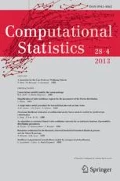This hardcover book deals with new algorithms that have practical and theoretic advantages in simulation practice. The application of the algorithms is not difficult due to the freely available UNU.RAN library and the code generator that can be tested on the authors’ web server.
The field of this nonuniform random variate generation research starts in the fifties of the last century. The authors present ideas and unifying concepts in this field. They show and demonstrate how these concepts can be used to obtain fast and robust algorithms. Other examples of possible applications of the authors algorithms like Bayesian statistics, option pricing, VaR, etc. are treated at the end of the book. Its lecture is technical and with good quality in the presentation.
The book has five parts. Part I presents basic concepts of random variate generation for continuous and discrete distributions. Part II deals with continuous univariate distributions. Part III explains recent universal algorithms for discrete distributions. Part IV presents general methods to generate random vectors and multivariate distributions. Part V contains methods and applications that are related to random variate generation.
A basis for statistical inference consists in the selection of a random sample from a population. This book provides factible arguments to this inferential previous phase to the estimation of a population parameter. The book touches a theme of high didactic importance in research that is also useful in practice. It is a good book on a relevant and key research area.
The main possible objective or application of this book consists in the generation of a sample from a finite population (of people of the world, a country, or a town). Survey sampling is an important field of application to resume real nature of facts; another didactic area of application is the simulation of theoretical and classical properties from probability theory and from other inferences based on hypothetical probabilistic models.
Reference
“Automatic Nonuniform Random Variate Generation” by W. Hörmann, J. Leydold, and G. Derflinger Springer-Verlag, Berlin, 2004 x + 442 pp.
Author information
Authors and Affiliations
Corresponding author
Rights and permissions
About this article
Cite this article
Espejo, M.R., Pineda, M.D. Automatic nonuniform random variate generation. Computational Statistics 19, 659–660 (2004). https://doi.org/10.1007/BF02753917
Published:
Issue Date:
DOI: https://doi.org/10.1007/BF02753917

